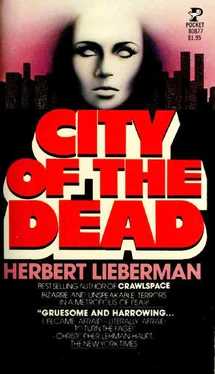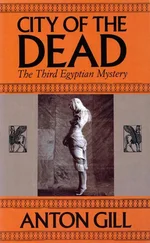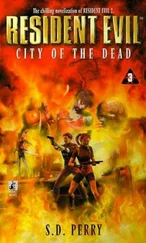“Well then, Douglas, say that. Say ‘the sergeant.’”
“Yeah—like I told him.”
“Not him, Douglas—the sergeant. Say ‘the sergeant.’ ”
“The sergeant—like I told the sergeant.”
“That’s better,” Haggard says gently.
The boy’s face is flooded with exasperation. “I was just standing around—”
“In the stairwell?”
“Yeah—in the stairwell.”
“Do you always stand around in stairwells, Douglas?”
“Like I told the sergeant here, I was delivering a package to one of the offices up there—”
“Good. We can check the package and the return address on it later. Please continue.”
“And this guy comes up to me.”
“In the stairwell?”
“Yeah—in the stairwell. And he hands me that.”
“The pipe?”
“Yeah. And he says, ‘Hold this for me, please. I’ll be back in a few minutes.’”
“Oh, I see,” says Haggard with his most effusive magnanimity. “This guy, the one who comes up to you in the stairwell. Ever see him before?”
“No. Never.”
“And so you just stood there holding the pipe for him?”
“Yeah,” the boy says, full of fake bravado. “That’s right.”
“Sounds perfectly plausible to me.” Haggard nods sympathetically. “What about you, Sergeant?”
“Sounds beautiful to me, Lieutenant.”
“Well, Douglas”—Haggard’s eyes twinkle merrily—“I hope Papa’s a real good lawyer. If he’s not, you’re going away for a long, long time.”
Haggard watches the defiance ooze from the boy’s eyes. Soon, he is certain, in just a few more minutes of questioning, those snotty, self-assured postures, all learned and imitated from trashy TV crime serials, will start to run all leaky and soft, like an overripe cheese.
“As it turns out, Douglas,” the detective goes on now, almost liltingly, “I’m not very interested in you. You’re too dumb to hold my attention very long. You’re small stuff. A fart in the blizzard, as they say. But I do have a few questions I want answered. If you can answer them, who knows—it may win you some points from the judge. Personally, I hope it doesn’t. Personally, I hope they toss you into a hole for about thirty years and bury you there. Thirty years. That’s what the bombing of public buildings is going for on the open market these days. Am I right, Fox?”
“That’s right, Lieutenant. Twenty to thirty in the Federal cooler.”
“Let me see—that’ll make you almost fifty when you get out. Fifty’s not a bad age, Douglas. There’s still some time left to beat the world.” Haggard watches with harsh amusement the notion of lengthy incarceration register behind the boy’s eyes.
“In your travels as a bomber, Douglas,” he hammers on pitilessly, “ever run into a chap named Klejewski?”
“Who?”
“Klejewski—Janos Klejewski. Some people call him Kunj or Kunje.”
The boy ponders the name a moment, then shrugs. “Never heard of him. Who is he?”
“A big monkey. Likes to play around with firecrackers, like you. What about the name Meacham? Ever hear of a young dude called Wally Meacham?”
The boy stares blankly at the detective. And in that blank stare, the detective can read all too clearly the answer to his question. As he turns from the boy, he can feel all the hope he’d been savoring for the past hour or so—since Wershba had called him with something “hot”—running out from him now, running out the way time, too, was running out for him. Suddenly there is a cold sickness in the pit of his stomach.
Fox follows him out the mail-room door, closing it gently behind him. Then in the bank once more, together the two men, heads tilted toward each other, confer for a moment.
“These are not your guys, ay, Lieutenant?”
Haggard nods, stands silently, arms folded, wondering where to go next. What to try. He pushes the battered gray fedora far back on his head and scratches the scalp beneath the white, fleecy, cotton-candy hair. “’Fraid not These are just small-town kids come to the big city to make good. See that bomb in there? Junk. Tinny. Lot of mickey mouse. Couldn’t blow a note on a trombone with twenty of ’em. Nope, the boys I’m looking for are pretty sophisticated with this kind of stuff. Timing mechanisms. High-powered concentrated explosives. Japanese firing pins. The works. None of this cheap pipe stuff.” Haggard sighs. “‘Well—better be on my way.”
He crams the fedora forward on his head and pulls up the collar of the rumpled trench coat.
Fox sees him through the lobby of the Pan Am Building, back out to 45th Street, where the curious crowds are still milling.
“All this got something to do with the ME, don’t it?” he asks when they reach the waiting patrol car.
Standing at the open door of the car, Haggard cocks a sharp glance back at him. “Where’d you hear that?”
“Heard something about his daughter.”
“Who told you?”
“No one. It’s around though—grapevine stuff, that’s all.”
Haggard regards him silently for a while. Then slowly his index finger rises to the sergeant’s lips and remains there momentarily. A hushing gesture. Then he’s gone.
Call, goddamn you, call. Just tell me what you want and when you want it. I’ll get it. I’ll be there. Just call. Please call. Give me back my kid.
3:00 p.m. Konig’s Office.
The Chief sits in the stuffy shadows of his unlighted office. Behind a littered, unattended desk, he waits, staring unblinkingly at his telephone, all his concentration focused upon it, as if invoking some enormous effort of will to make it ring.
He has been sitting there for the past hour or so in those shadows, staring at the small, dark shape, conjuring it. In his head he carries on a series of imaginary dialogues with Wally Meacham. What he will say. How he will say it. What he will concede. He knows, of course, that he will concede everything. Everything is negotiable. But there is, too, buzzing annoyingly at the back of his head, Haggard’s stern admonition. “Don’t go it alone. Wait for me before you do a thing.”
Several times during that afternoon the phone has rung—reporters and the network lice trying to scare up a scandal. Not only do they have the delicious grisliness of a body-snatching scandal, but now it’s the Robinson business, and Carslin issuing a new press release every quarter-hour or so from the DA’s office. An opportunity for high moral dudgeon on the editorial page.
Konig had declined to speak with any of the media people. But when Benjamin called he had no choice but to speak. There was little doubt in his mind what the call was in regard to, and when the Deputy Mayor reminded him to appear the following morning at the DA’s office, he merely mumbled his assent. It occurred to him at that point that he didn’t particularly care what they did to him anymore.
Several times during the afternoon he had lumbered down the hall to Haggard’s office. There were questions and he was seeking reassurance. Finding no one there each time, he would leave vague, incoherent little notes on scraps of paper on the desk, then lumber back to his own office.
He had not been down to the autopsy rooms once that day. On his desk there were protocols to be read, death certificates to be signed, insurance reports to be filled out, innumerable calls and floods of mail to respond to. He had done nothing. He had let his work slide. He had assiduously avoided seeing any of his colleagues. He knew they had questions for him, as they always did, and that he was holding up their work unpardonably. He knew they sensed something was wrong. Drastically wrong. He knew they were uneasy and that they talked amongst themselves. That Strang, rest assured, was somewhere out there, even now, slandering him, promoting himself among the Mayor’s well-paid lackeys at City Hall.
Читать дальше












